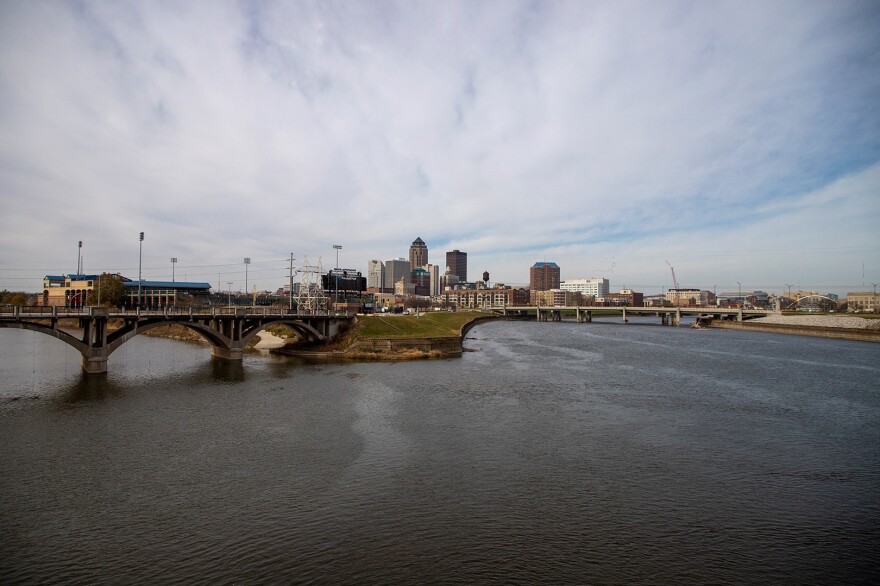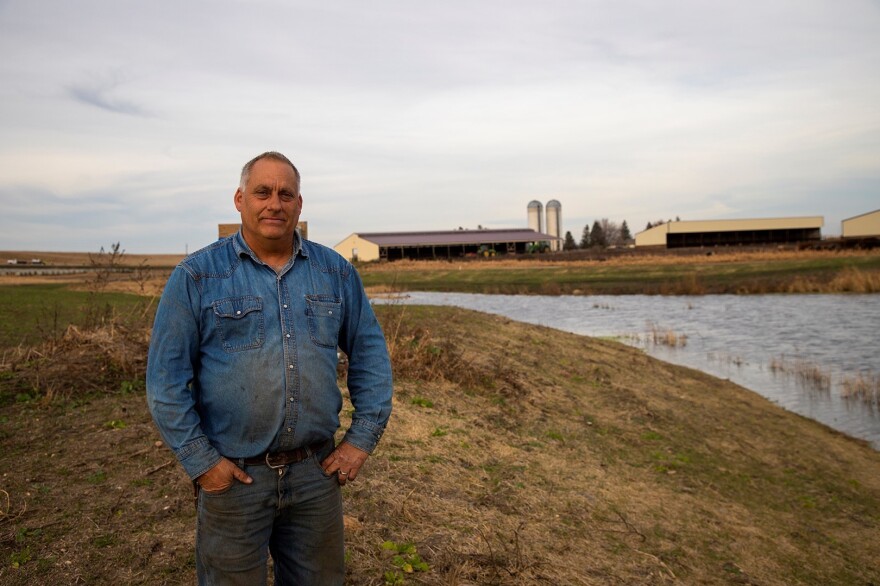Updated November 23, 2021 at 8:58 AM ET
Janis Elliott started testing the private well water that comes out of the faucets in her home for nitrates after she attended an environmental meeting more than five years ago. Elliott lives in the small unincorporated town of Avon, Iowa not too far south of Des Moines.
Nitrate finds its way into surface and groundwater that eventually becomes drinking water. Studies have linked ingesting too much nitrate in drinking water to cancer and that concerns the retired teacher. Too much nitrate also can cause blue-baby syndrome and birth defects.
She points to neighbors' houses where people have died from cancer. Her husband had prostate cancer (and overcame it).
The Environmental Protection Agency's health standard is 10 parts per million.
One year, the nitrate level got up to 19 parts per million.
"Which is almost double the federal legal limit for drinking water," Elliott says. "So, we were drinking poison for a year."

Elliott invested in a $1,000-reverse osmosis system in her home to treat the water her family drinks. She questions whether the nitrates in the water caused cancer among her husband and neighbors.
"Who knows? I do know that drinking that water for years did not help," she says.
Climate change and polluted sources for drinking water are creating an increasingly challenging problem in farm country. Des Moines Water Works is preparing for a very wet spring after almost two years of drought. While nitrate occurs naturally, it is also a byproduct of nitrogen fertilizer and farmers in the Midwest use lots of it to grow corn and soybeans. That finds its way into surface and groundwater.

The drought makes it more difficult for utility companies to source water
Larger water utilities – like Des Moines Water Works – have been treating nitrate for years. In the 1990s, the utility built a facility to extract nitrates from the rivers. Water Works gets most of its water for its 600,000 ratepayers from the Raccoon and Des Moines Rivers, which converge downtown.
"The drought obviously makes it more difficult for us to source water," Des Moines Water Works CEO and General Manager Ted Corrigan says. "This summer, especially we had concerns about toxins on the Des Moines River and we had concerns about available flow on the Raccoon River."
Add to that, swings in the weather brought on by climate change are adding another problem.
"We also see issues with the quantity of nutrient that is stored on the landscape because of the drought," Corrigan says. He says all that excess nutrient stored in the soil upstream makes for the potential for extremely high nitrates flushing into the rivers.
"It's not a sustainable situation," Corrigan says.
Dozens of other public water utilities in Iowa also treat drinking water for nitrates. Water Works has upgraded its facility and constructed deep wells to store more water and it's looking at building additional groundwater wells. Federal clean water laws exempt agricultural runoff. The utility filed a lawsuit five years ago to try and amend the Clean Water Act, so farmers would have to implement more environmental practices but it was ultimately dismissed.

Farmers know what tools to use but they are costly and cumbersome
More than 90 miles upstream from Des Moines, Mark Schleisman farms with his father and kids in Calhoun County near the Raccoon River. He has a number of water quality projects on his diversified farm. He has buffer strips and plants cover crops. He even has a wetland on his property that is hooked up to an irrigation system so he can re-use water from his fields.
"It helps the river because we're keeping nitrates here, reducing them, but also helps me because I'm getting water on this field and I'm reusing the nitrogen," Schleisman says.
He says farmers know what tools to use but they are costly and can be cumbersome.
Politicians in Iowa say the state's farmers are making progress since 2013 when the state issued the Iowa Nutrient Reduction Strategy: a list of environmental practices farmers are encouraged to implement.
"We've got a long ways to go and I don't sugar coat that at all," Iowa Secretary of Agriculture and Land Stewardship Mike Naig said earlier this year on the Iowa PBS show Iowa Press. "The strategy calls for a 45% reduction in nitrogen and phosphorous loss off of Iowa farms and landscape but the evidence is moving in the right direction."
University of Iowa geographical and sustainability sciences professor, Silvia Secchi, says the reduction from farms is not moving fast enough. She argues that the federal farm bill essentially subsidizes farmers to pollute.
"What we need to do is we need to ask for some environmental outcome for all the money we give to farmers," Secchi says. "That will reduce the load so that the utilities don't have to spend so much money cleaning up the water that we drink."
And Secchi says it's a bigger concern for utilities in smaller cities and residents who rely on their private wells that may have nitrate-tainted water. The challenges in Iowa could soon be felt in other cities surrounded by farmland especially as they increasingly face drastic weather swings that effect drinking water.
Copyright 2021 Iowa Public Radio

